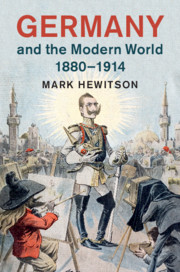‘In Germany and the Modern World, 1880–1914 Mark Hewitson develops an astutely measured, non-polemical appraisal of the concept of the ‘globalized nation' on the eve of the First World War, setting the irreducible Europeanness of Germany's dynamism beside and against the wider overseas expansionism. An authoritative, timely and beautifully executed intervention.'
Geoff Eley - University of Michigan
‘This is simply an impressive contribution by Mark Hewitson. The book makes a timely, crucial and critical contribution to the German Empire and its interwoven relationships within Europe and beyond in a globalizing world around 1900.'
Bernhard Struck - University of St Andrews
‘This is a welcome historical analysis of German national identity in the era before the First World War, during what is often called the ‘first global age'. The study, which challenges many of the claims made about the impact of globalization, is certain to provoke reflection and controversy.'
Roger Chickering - Georgetown University, Washington DC
'Wide ranging and ambitious, Hewitson’s examination of the process of German nation building integrates topics that include modernity, globalization, transnationalism, imperialism, nationalism, and racism. Scholars will also find considerable value in Hewitson’s extensive engagement throughout with varied strands of historiographic literature. Highly recommended.'
A. C. Stanley
Source: Choice
‘By highlighting the ways in which the expansion of transnational contacts and networks shaped - or failed to shape - public discourses on imperialism, nationalism, economics, and foreign policy, he makes a compelling case for continuing to situate the nation-state at, or near, the center of studies of the first phase of globalization. As a result, Germany and the Modern World, 1880–1914 will be essential reading for scholars and students of German history on the eve of the 'short twentieth century'.'
Gavin Wiens
Source: H-Transnational German Studies
'Hewitson has written a very balanced book, full of new and often surprising insights … He debunks many traditional assumptions, and presents interesting contemporary illustrations … A timely and welcome book indeed.'
Martijn Lak
Source: European History Quarterly



